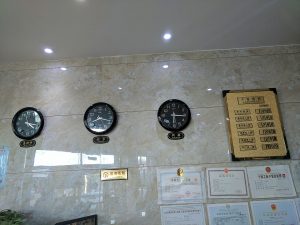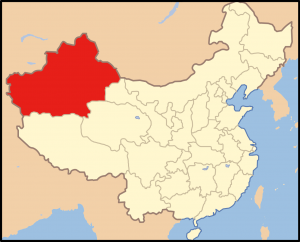Xinjiang Time by Vivian Le
We tend to think of time zones as practical tools, but they aren’t always — some become intertwined with power, politics, and freedom. In most larger countries, time zones break land masses up into different areas, but not so with China, which has but one broadly spanning time zone despite being about the same width as the United States. In theory, one would expect there to be around five Chinese time zones. In fact, at one point China did have that many, but only until 1949.

With the establishment of the People’s Republic of China, everything changed. After a long civil war, the Communist party prevailed and the new leadership felt that a single time zone would help unify the nation. The new Beijing Time was considered simple, efficient, egalitarian.

But not everyone in China adheres to this wide-reaching single time zone. In Xinjiang, an autonomous territory in the northwest, there are around 12 million Uyghurs — an ethnic minority native to the region. Uyghurs are culturally very different from the Han majority that makes up over 90% of China. For decades, the Chinese government has been worried about separatism in the region, which has led to some very severe, state-sponsored suppression of Uyghur life, including an ongoing genocide. Among the cultural differences between people in the region is a pair of attitudes around time zones. For decades, the Uyghur have operated around Xinjiang “local time,” not Beijing time (two hours off).

Beijing time was and still is the official time zone in Xinjiang — train stations, government offices, and the like have long run on Beijing’s clock. If you were to ask a Han person what time it was they would tell you in Beijing time. But local time is, in fact, much closer to what most would consider normal or obvious, tracing the solar day. And while technically Han residents still adhered to Beijing time in principle, few do in practice — mostly, they live and work during normal daylight hours. For practical everyday purposes, language helps people tell the difference, too — someone saying the time in Mandarin is probably referring to Beijing time, for example. At least in the past, there was a kind of code-switching that happened when someone is speaking Uyghur instead. There was also arguably an element of dissent here — Uyghurs resisting openly could get in trouble, but using a different time is more subtle. Setting one’s watch to local time thus becomes a small act of defiance.
Meanwhile, times have changed — the situation for the Uyghurs has officially escalated to the point of being a recognized genocide. And among many other human rights violations, a large population of Uyghurs and other Muslim minorities have been detained in what has been officially called “vocational education and training centers” but are effectively reeducation camps. Amidst all of this, changing one’s watch is of course harder than ever — the state tracks phones, and setting one’s zone to local time would be known by the government. While that might not be illegal per se, it could attract attention.
There are, however, many things that can be interpreted as a “sign of separatism” like wearing a headscarf, having a beard, having WhatsApp installed on your phone — even simply speaking to someone who lives abroad has gotten people in trouble with the government. Self-censorship has become an unfortunately necessary norm. So “time” is just one example of how these intimate parts of Uyghur culture are being suppressed. Having one time zone across China may promote national unity, but of course, it also means suppressing the things that don’t fit. And from the beginning, it was very obvious who wouldn’t fit into a system centered on Beijing time. That single, centralized time becomes a reminder of who and what is at the center of China.



Comments (20)
Share
fab series, as ever.
But as an architect, working in Bristol – one very small detail you have wrong.
The black hand on the Corn Exchange clock is in fact Bristol time, nearly ten minutes solar mean behind Solar noon time in London (GMT as was) – London being 100miles east so almost exactly 10minutes delay, as the world rotates, at this latitude (52degrees North)
Thought you’d find that interesting; keep- up the great work!
I have THE solution to Standard time.
It is hard to adjust to a one hour change in the clock every 6 months, especially when the clock changes back in the Spring.
The solution it to change 10 minutes EACH month. It is easy to adjust to a 10 minute change.
Problem solved!!!
Why stop there? If you slew it at 20 seconds a day hardly anyone would even notice.
Code-switching in talking about the time also happens in east Africa, where many languages start counting the hours from what in English is called 6 am. So someone might talk about meeting for lunch at seven (when speaking their own language) or 1 pm (when speaking English).
In fact, now I think of it, timekeeping also started from sunrise in ancient Rome and other ancient cultures – e.g. see https://en.wikipedia.org/wiki/Roman_timekeeping and https://en.wikipedia.org/wiki/Relative_hour Wikipedia has reminded me that the word “siesta” originally referred to something that would happen at the sixth hour – i.e. around noon.
In some East Asian countries like Vietnam or China in ancient time, local government is responsible for night time keeping. A night is divided into 5 periods (called “canh” which literally means guard shift in Vietnamese). Every two hours or so a guard at the village hall beats a drum loudly to announce the time and the shift change. How they know what time it is varies from place to place and from period to period in history. It could be a water drip clock, or burning incense, or a western time piece, or just plain old guessing. This practice continued until after WWII in some places. In places where there is no village time keeper, people use roosters to know when to wake up for work. The roosters (everywhere in the world starting from a very old period in history of evolution I would guess) always crow at about the same time every night: midnight, then 3:00 AM, then 5-6 AM. People also used the moon to tell time. If they know the date in the lunar month, they can tell the time by just looking where the moon is in the sky. This method has a lot of limitation however since in the first quarter, the moon disappears after 9-10 PM, not even mentioning cloudy nights, and the fact that you have to wake up and step outside and look.
Waker uppers can still be hired in the form of personal caller services. These phone operators, mostly from India, are often used by adult children who need someone to call their elderly parents and remind them to take meds or keep appointments. But others might use them for personal wake up calls, keeping up with and developing habits, and other reminders.
I’ve been a subscriber and fan of 99% invisible since 2017, and your show brought me knowledge and joy combined so far, however, I find the Xinjiang section of this episode inappropriate and unacceptable. Being a Chinese who has traveled in Xinjiang as early as 2004, and lived in different countries such as UK and USA, I think your interpretation of the single time zone as a symbol of suppression is a condescending prejudice. Even a coin has two sides, and you’ve deliberately omitted the fact that transportation, communication and administration have benefited substantially from the single time zone across the whole country. Moreover, my fellow Chinese are all smart enough to ‘code-switch’ without going through your demonized way of time-telling. Having worked in the northwestern part of China since 2015, I didn’t experience any of the ‘trouble’ potentially threatening my liberty or well-being by following the Beijing time. Politicising every detail of ordinary life in China without critically assessing the information is a real shame. The comments from interviewees are biased, and they are strongly misleading for people who are interested in the culture and history of ethnic groups in China. I am deeply disappointed at your choice of perspective, and I have to speak up and demand an apology.
Thank you for this great series!
As a person from West Iceland, I’ve lived my whole life on almost double daylight saving and I would not want it any other way. Yes, the mornings are dark in the winter, but everyone is only rushing to work anyway. I find it way better to still have some daylight after work, when we are actually free to enjoy it.
Really interesting episode covering so many different aspects of time keeping. I am not an expert on sleep but remember reading in a recent best selling book on the subject (Matthew Walker’s Why We Sleep) about the rather disruptive impact of the one hour change during daylight saving time on sleep. The overnight change increases the short term risk of heart attack, stroke and even traffic accidents. (https://www.sleepfoundation.org/circadian-rhythm/how-to-prepare-for-daylight-saving-time). It is also interesting observing this on a baby who really doesn’t care about what the clock says but reacts more intuitively to the daylight itself and the daily routine around him/her. After the one hour clock move, it would take the baby a month or two to adjust the sleep pattern to the new “timezone”. But for adults we are forced to do that overnight!
“Gardner Bovingdon” reminds me of another name, an art historian named Bendor Grosvenor.
My parents are from Saskatchewan Canada, and there they don’t fall back in the winter! They don’t do double summer time, probably because it turns out early sunsets in the winter also means late sunsets in the summer and it isn’t really necessary. Canada Day fireworks are always very frustrating for parents of young children because of how late you have to stay up to see them.
My parents are not big fans of daylight saving time, and I have to say, living in Ontario and having to bus home from my 5pm classes in the pitch blackness makes the idea of year round daylight saving seem very enticing.
It kinda surprised me that Chris Berube didn’t talk about how one of Canada’s provinces, Saskatchewan, is on permanent daylight saving time!
Saskatchewan has a lot of farming, and parts of it are quite Northern, so it really does make sense to not fall back at all and stay on DST all year round. Weirdly, even though a good portion of Saskatchewan is less northern than Scotland, nobody really minds the dark mornings. Probably because the convenience of not having to move the clocks outweighs the inconvenience of the dark mornings.
My parents are from Saskatchewan, and when they moved to Ontario they found the clock changing extremely frustrating, and I must say the idea of not having to come home from school or work in the pitch blackness is somewhat enticing.
This might be a duplicate comment, I’m not sure if the first one didn’t work or if there’s just a glitch
In 1975 I had a summer job in the kitchens of a holiday camp in Wales. We had a Liverpudlian former seafarer whose job was knocker up, to get the kitchen staff who were on early shift to work on time. His name was Paddy McKeown, a good Liverpool-Irish name, and he took his job very seriously. He could often be found in the staff bar berating those who’d had a few drinks. ‘Get to bed, you horrible thing, you’re on early tomorrow!’ Of course the inevitable happened and he slept in. Chaos ensued that morning and he was assigned a less crucial post.
The main entrance had a row of twenty or so flags of many nations which were hoisted each morning and lowered each night. Another gentleman called Cliff had the job of flag man, and his responsibility was solely the raising and lowering of the flags.
Fascinating to hear about the transition to accepted standards – that by their very nature become normalised and (>99%) invisible…
Other examples include the screw thread and TCP/IP – which would make for interesting stories
One localisation point: “row” houses in the UK are known as Terraced houses.
Fabulous episode as always, but I also have to say that was the best outro yet :) Thank you Roman and the 99PI team :)
Excellent episode as always. I just didn’t get why people keep laughing throughout the episode, including Roman. The world is larger than the US, there is nothing funny about how other nations decide to conduct their own business.
An extra problem with double daylight saving time is that it would have aligned UK time with Central European Time. Maybe that’s why then-future Brexiteers like Mogg didn’t like it.
A further trivium for time-nerds: Here in Ireland standard time is GMT+1. In winter, time changes to GMT. So summer time is standard time. That puts us on the same clock as the UK, without admitting it.
Just listened to your episode on time and knocker uppers and I had to laugh. I used to do paper routes for the Columbus Dispatch as a kid in the 2000’s. Customers occasionally left standing notes to the paper carriers, and while I was substituting for another friends’ paper route one week I saw one really strange one that said something like: “Throw the newspaper hard against the metal screen door so customer can wake up.” I was really confused. The next morning I ran past, threw the paper neatly to his doormat as always. Then I stopped abruptly, ran back, looked down at the paper, looked back at the instruction sheet, picked up the paper, and (grimacing) hit it as hard– but also as softly– as I possibly dared. Then thinking maybe it wasn’t loud enough, I picked it up again and hit the door one more time before plopping it back on the mat. I considered it with a cocked head for a moment, and then ran to the next house. It was so awkward. My friend later told me that that guy tipped really well so it was worth the weirdness.
So maybe the knocker uppers didn’t *really* die until the 2000’s! Because I was one of them! (And surely he’s a digital subscriber now, right?)
I’m a little surprised that Roman is so adamant that noon must be the time when the sky is at its highest point. Time is just a construct that we’re imposing on the day. Why does “9 AM” have to be “business start time?”
As someone that writes software that can be used online, ie anywhere, and everyone expects the time to be their local time I can tell you that time zones are a massive PITA. Then throw in daylight savings time, and the places that do and don’t follow it and the ones that pick a different zone because its more convenient for business (I’m looking at you Indiana). If you work with people all across the country you know how hard it is to communicate when you’re meeting. My time, your time, some other time?
How about we get rid of time zones entirely. Just use GMT. Cites, states, can set their consensus business hours, they might be 2200-0600. But everyone knows when that is and if they are going to be able to reach someone in that office. Simplify everything while going back to local time.